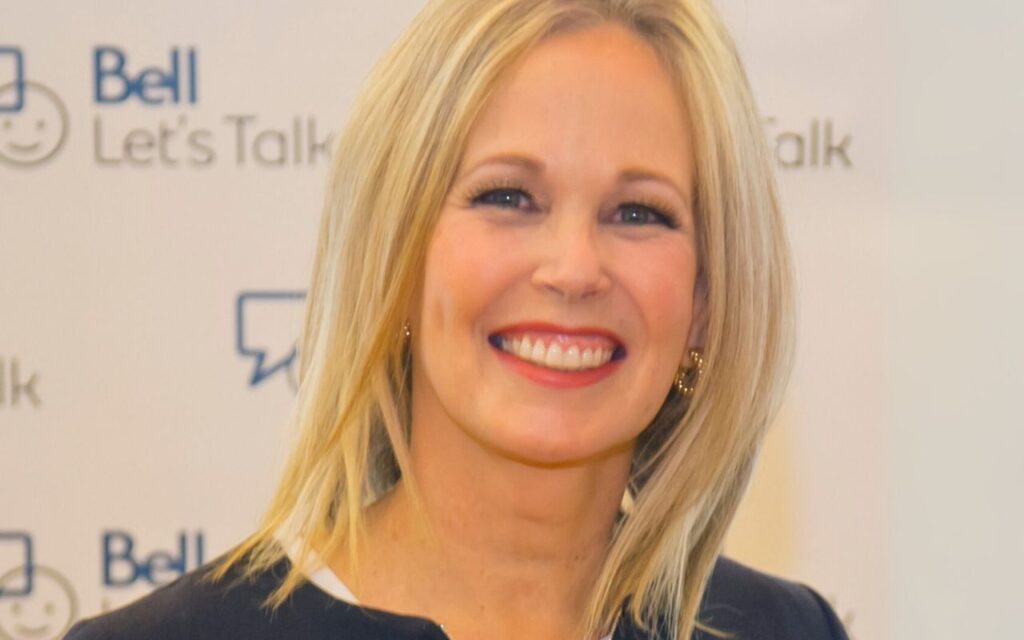
If you ask Mary Deacon what first sparked her passion for mental health advocacy, she’ll tell you it wasn’t theory or training – it was personal.
In August 1991, just weeks after having her first baby, her younger brother David took his own life at the age of 25.
“There are no words to describe it… It totally changed my life and the life of my family,” she said. “It brought to the forefront something that I didn’t know anything about, and that really started me on my journey.”
Tragically, a few years later, Deacon lost her other brother, Ted, in the same way.
Those experiences laid bare the realities of mental illness and the stigma that too often prevents people from seeking help. Out of that pain, however, came a resolve to push for change – one that would go on to define Deacon’s career and help shift the national conversation around mental health.
Hey Bell, let’s talk
Deacon’s path eventually led her to the Centre for Addiction and Mental Health Foundation, where she honed her skills as an advocate and leader in the space. But it was 2010 when she was approached with an unprecedented opportunity: to help launch a corporate initiative aimed at addressing mental health in a meaningful, national way.
Mental health, up to that point, had rarely received this kind of corporate attention, but Bell was willing to step up, and Deacon was brought on to lead the team and make it happen.
That’s when Bell Let’s Talk was born.
“We started with a blank piece of paper, and frankly, had absolutely no idea that it would grow to be what it is,” she said. But grow it did, into a national movement built around improving access to mental health services and breaking the stigma that so many struggle with.
An important part of the overall initiative is Bell Let’s Talk Day which takes place each January and has become Canada’s national day dedicated to promoting mental health. Through social media stories, awareness campaigns and community engagement, Bell not only donates critical funds for mental health care but also encourages Canadians to speak openly about mental health and support one another.
Since its launch, Bell Let’s Talk has invested over $180 million to advance awareness, action, and access to mental health services. The initiative has partnered with over 1,500 local organizations and helped nearly seven million Canadians access supports and services through funded programs.
Yet for Deacon, the impact isn’t just measured in numbers.
“For every story we hear that ends tragically, there are so many others with happy endings,” she said. “Personal stories of struggle but also of hope and recovery show what’s possible when support and understanding are available.”
It’s also why Deacon is so open in speaking about her own challenges.
“I have treatment-resistant depression… It’s a part of who I am, but it doesn’t define me,” she said. “Two-thirds of people with mental health issues say the reason they don’t seek help is because of stigma and fear of discrimination. If people don’t feel safe, supported and heard, it is very difficult to come forward and seek help. We need to continue to fight the stigma while ensuring that culturally appropriate supports and services are easily accessible.”
Looking to the future
While Bell Let’s Talk has become a household name, Deacon is quick to note that the initiative is just one part of a larger ecosystem. “We are not the experts however we mobilize behind hundreds of incredible mental health organizations across Canada to further the mental health conversation.”
“There has been a seismic change in how we talk about mental health as a society and within our country,” she said. “It went from being silent and invisible to loud and undeniable.”
Deacon also emphasizes that while there have been significant strides in raising awareness and funding over the last 15 years, systemic gaps in mental health care remain a pressing challenge. Access to services across Canada remains uneven, with long wait times, regional and cultural disparities, and high costs making specialized care unaffordable for many.
“We’ve made progress, but there’s still a long way to go,” she noted. She points to the need for structural change, including more consistent funding for psychotherapy, early intervention programs, and preventative care that can reach people before crises emerge.
“Consistent coverage for psychotherapy in provincial and territorial health care plans would be a game changer in this country,” she added. “We have to get to a place where mental health and physical health are covered in the same way and treated the same way in our overall healthcare system.”
Even as the initiative continues to grow, Deacon recognizes the work isn’t finished. The landscape is constantly evolving, with new challenges like eco-anxiety, the impact of excessive social media use, the effects of the pandemic, and political and financial uncertainty. “All these things and more make it imperative that we have an evidence-based, accessible system of supports and services,” she added.
That’s true not only for those seeking care but also for those providing it. Deacon points out that people working in the mental health space – counsellors, advocates, even people like herself – carry an emotional load that can take its own toll if left unchecked.
“The reality is that the work can be rewarding and challenging at the same time,” she said, stressing the need for those in the sector to prioritize their own well-being if they’re going to be effective in supporting others.
Yet, despite the weight of the work, she remains dedicated and optimistic.
“It was my personal experience that gave me the passion to do this work, and I still have it to this day,” she said. “I wake up every day feeling fortunate that I can come to work and do something that means so much to me personally, but also that is making a difference.”









